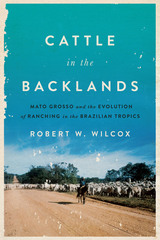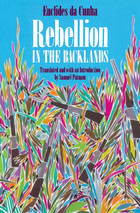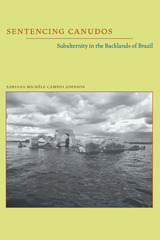
Henry A. Wallace Award, The Agricultural History Society, 2018
Brazil has the second-largest cattle herd in the world and is a major exporter of beef. While ranching in the Amazon—and its destructive environmental consequences—receives attention from both the media and scholars, the states of Mato Grosso and Mato Grosso do Sul actually host the most cattle. A significant beef producer in Brazil beginning in the late nineteenth century, the region served as a laboratory for raising cattle in the tropics, where temperate zone ranching practices do not work. Mato Grosso ranchers and cowboys transformed ranching’s relationship with the environment, including the introduction of an exotic cattle breed—the Zebu—that now dominates Latin American tropical ranching.
Cattle in the Backlands presents a comprehensive history of ranching in Mato Grosso. Using extensive primary sources, Robert W. Wilcox explores three key aspects: the economic transformation of a remote frontier region through modern technical inputs; the resulting social changes, especially in labor structures and land tenure; and environmental factors, including the long-term impact of ranching on ecosystems, which, he contends, was not as detrimental as might be assumed. Wilcox demonstrates that ranching practices in Mato Grosso set the parameters for tropical beef production in Brazil and throughout Latin America. As the region was incorporated into national and international economic structures, its ranching industry experienced the entry of foreign investment, the introduction of capitalized processing facilities, and nascent discussions of ecological impacts—developments that later affected many sectors of the Brazilian economy.

"Euclides da Cunha went on the campaigns [against Conselheiro] as a journalist and what he returned with and published in 1902 is still unsurpassed in Latin American literature. Cunha is a talent as grand, spacious, entangled with knowledge, curiosity, and bafflement as the country itself. . . . On every page there is a heart of idea, speculation, dramatic observation that tells of a creative mission undertaken, the identity of the nation, and also the creation of a pure and eloquent prose style."—Elizabeth Hardwick, Bartleby in Manhattan

In the late nineteenth century, the Brazilian army staged several campaigns against the settlement of Canudos in northeastern Brazil. The colony’s residents, primarily disenfranchised former slaves, mestizos, landless farmers, and uprooted Indians, followed a man known as Antonio Conselheiro (“The Counselor”), who promoted a communal existence, free of taxes and oppression. To the fledgling republic of Brazil, the settlement represented a threat to their system of government, which had only recently been freed from monarchy. Estimates of the death toll at Canudos range from fifteen thousand to thirty thousand.
Sentencing Canudos offers an original perspective on the hegemonic intellectual discourse surrounding this monumental event in Brazilian history. In her study, Adriana Michele Campos Johnson offers a close examination of nation building and the silencing of “other” voices through the reinvisioning of history. Looking primarily to Euclides da Cunha’s Os Sertões, which has become the defining—and nearly exclusive—account of the conflict, she maintains that the events and people of Canudos have been “sentenced” to history by this work. Johnson investigates other accounts of Canudos such as local oral histories, letters, newspaper articles, and the writings of Cunha’s contemporaries, Afonso Arinos and Manoel Benício, in order to strip away political agendas. She also seeks to place the inhabitants and events of Canudos within the realm of “everydayness” by recalling aspects of daily life that have been left out of official histories.
Johnson analyzes the role of intellectuals in the process of culture and state formation and the ensuing sublimation of subaltern histories and populations. She echoes recent scholarship that posits subalternity as the product of discourse that must be disputed in order to recover cultural identities and offers a view of Canudos and postcolonial Latin America as a place to think from, not about.
READERS
Browse our collection.
PUBLISHERS
See BiblioVault's publisher services.
STUDENT SERVICES
Files for college accessibility offices.
UChicago Accessibility Resources
home | accessibility | search | about | contact us
BiblioVault ® 2001 - 2024
The University of Chicago Press









